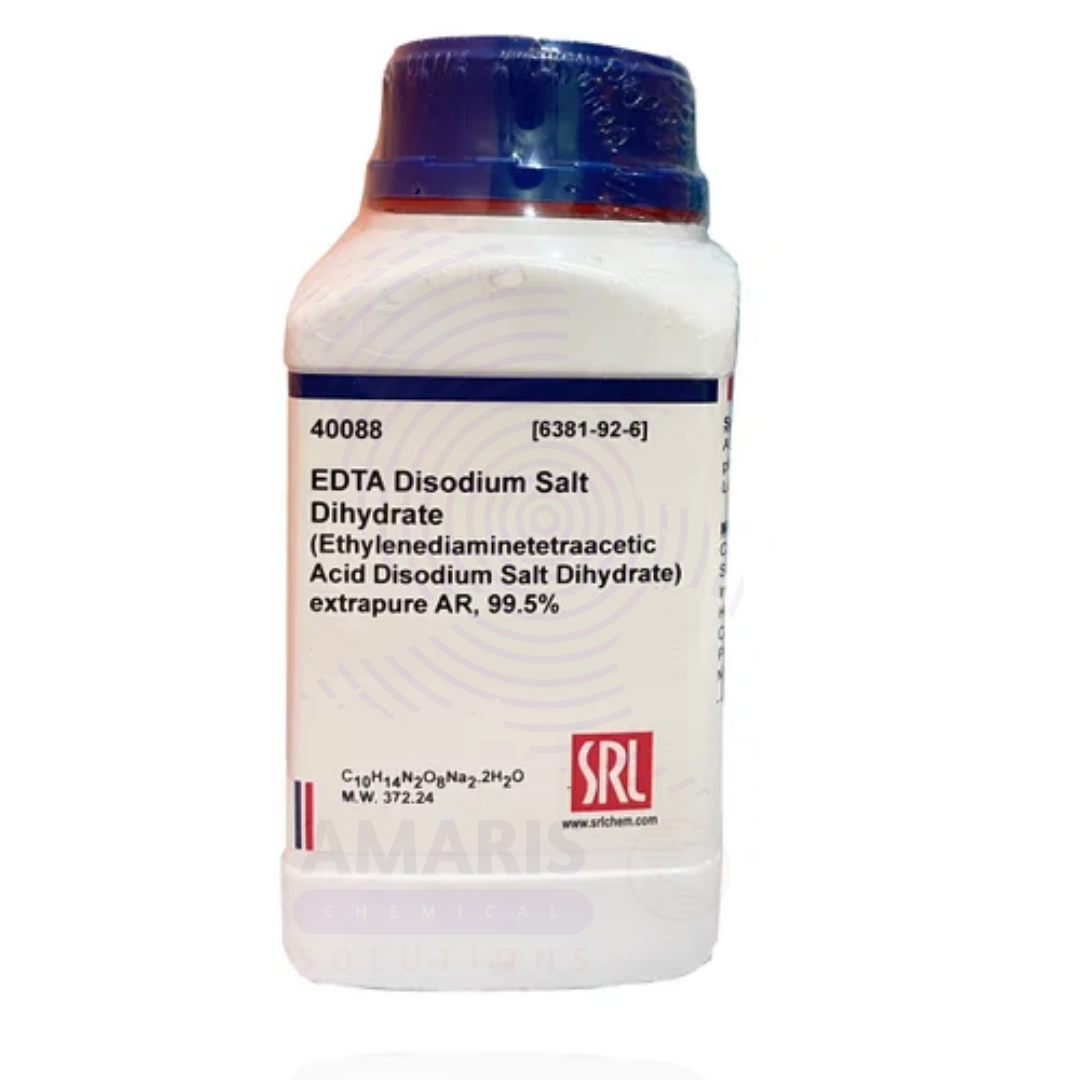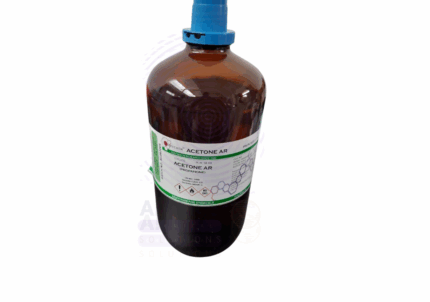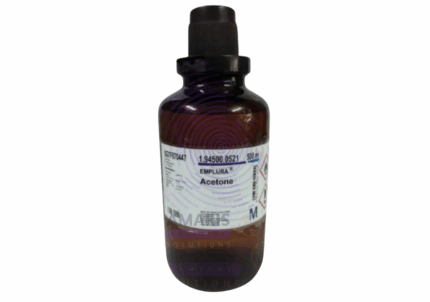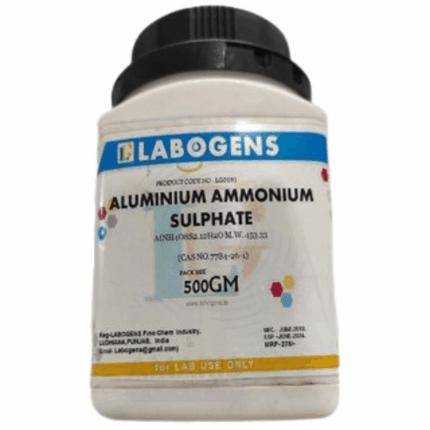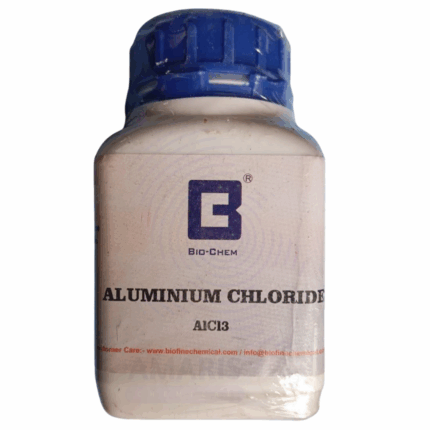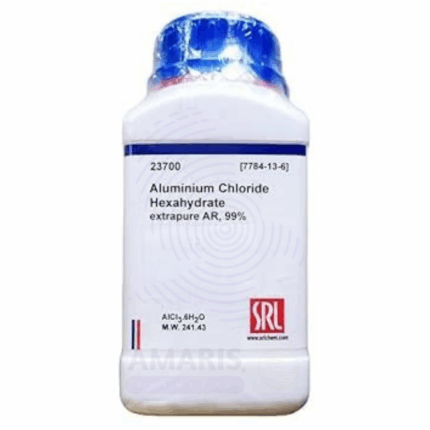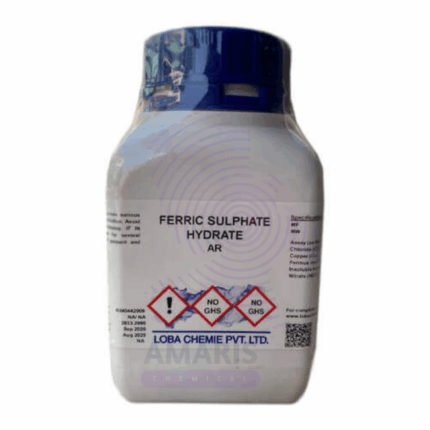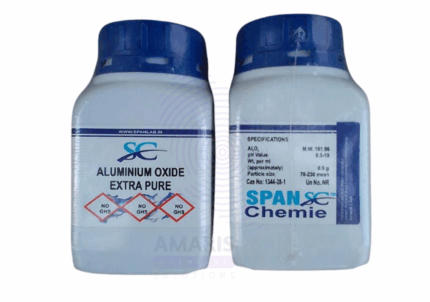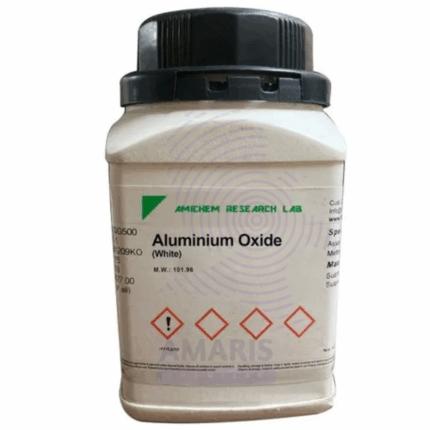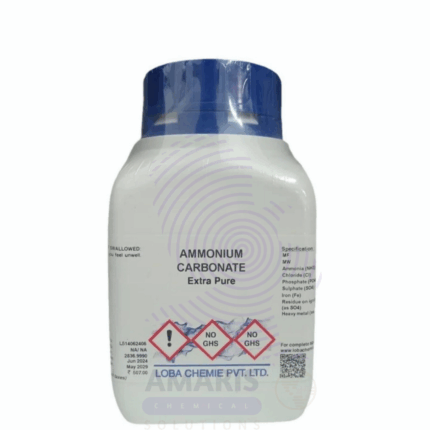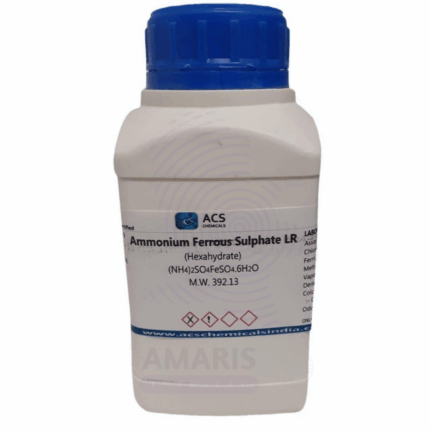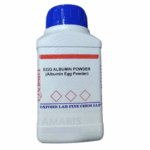
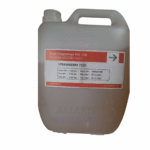
EDTA Disodium Salt Extra Pure
$ 19.15
EDTA Disodium Salt Extra Pure is a high-purity chelating agent widely used in laboratory settings for complexometric titrations, metal ion sequestration, and buffer preparation. It binds strongly with divalent and trivalent metal ions like calcium, magnesium, and iron, making it essential in water hardness testing, biochemical research, and analytical chemistry. Its stability and effectiveness in controlling metal ion activity also make it valuable in molecular biology protocols and diagnostic reagent formulations.
EDTA Disodium Salt Extra Pure
Primary Uses
- Chelating agent in titrations (complexometric analysis):
Commonly used to determine concentrations of metal ions like calcium, magnesium, iron, and lead in water hardness and metal assays. - Buffer component in molecular biology and biochemistry:
Helps stabilize pH and protect DNA and enzymes by binding divalent metal ions (e.g., Mg²⁺, Ca²⁺) that may catalyze degradation. - Water softening in analytical procedures:
Binds with metal ions in hard water to prevent interference with chemical reactions. - Preservative in biological and chemical formulations:
Inhibits metal-catalyzed oxidation and microbial growth.
Secondary Uses
- Electrophoresis buffer preparation (e.g., TAE, TBE):
Used in DNA/RNA electrophoresis to maintain ionic strength and inhibit nuclease activity. - Decalcification in histology and microscopy:
Removes calcium from tissue samples for easier sectioning and analysis. - Cleaning solution additive for laboratory glassware:
Dissolves metal deposits and scales during glassware maintenance. - Stabilizing agent in enzymatic reactions:
Prevents unwanted metal-ion-mediated side reactions.
| PACK SIZE |
500 grams Plastic Tin |
|---|
1. Basic Identification Attributes
- Chemical Name: Ethylenediaminetetraacetic Acid Disodium Salt
- Other Names: Disodium EDTA, EDTA-Na₂, Disodium ethylenediaminetetraacetate
- Chemical Formula: C₁₀H₁₄N₂Na₂O₈·2H₂O (commonly as dihydrate)
- CAS Number: 6381-92-6 (dihydrate), 139-33-3 (anhydrous)
- Grade: Extra Pure (Laboratory Grade)
- Molecular Weight: 372.24 g/mol (dihydrate)
- Appearance: White crystalline powder
2. Physical & Chemical Properties
- Solubility: Soluble in water (~10–100 g/L)
- pH (1% solution): ~4–6
- Melting Point: >240 °C (decomposes)
- Stability: Stable under recommended storage conditions
- Odor: Odorless
3. Safety & Hazard Attributes
- GHS Classification: Not classified as hazardous under GHS
- Hazard Statements:
- May cause mild skin or eye irritation with prolonged exposure
- PPE Requirements:
- Safety goggles
- Lab coat
- Gloves
- First Aid Measures:
- Inhalation: Move to fresh air; seek medical attention if symptoms persist
- Skin Contact: Wash with soap and water
- Eye Contact: Rinse cautiously with water for several minutes
- Ingestion: Rinse mouth; seek medical advice if feeling unwell
4. Storage & Handling Attributes
- Storage Conditions:
- Store in a tightly sealed container
- Keep in a cool, dry, well-ventilated place
- Protect from moisture and strong oxidizers
- Handling Notes:
- Avoid dust formation
- Use in a fume hood if dust or aerosol is generated
5. Regulatory & Compliance Attributes
- EC Number: 205-358-3
- UN Number: Not regulated
- Hazard Class: Non-hazardous
- REACH Status: Registered
6. Laboratory Applications
- Primary Uses:
- Chelating agent for metal ions in analytical and biochemical applications
- Used in complexometric titrations (especially Ca²⁺ and Mg²⁺)
- Reagent in buffers, detergents, and DNA extraction protocols
- Other Uses:
- Water softening in lab experiments
- Preparation of metal ion-free solutions
- Preservative in some biological formulations
SAFETY PRECAUTIONS
- PPE: Lab coat, gloves, and safety goggles recommended
- Storage Conditions:
- Store in a cool, dry place
- Keep container tightly closed and away from moisture and incompatible substances
- Incompatible With: Strong oxidizers, strong acids
STABILITY & REACTIVITY
- Stability: Stable under standard lab conditions
- Reactivity: Chelates metal ions strongly; not suitable for metal-ion dependent reactions
- pH Range of Solutions: Typically 4–9 (commonly used around pH 7–8)
FIRST AID MEASURES
- Inhalation: Move to fresh air; seek medical attention if symptoms persist
- Skin Contact: Wash with soap and water
- Eye Contact: Rinse with water for several minutes; consult medical help if irritation persists
- Ingestion: Rinse mouth; seek medical advice
Related products
Acetone Extra Pure
Aluminium Ammonium Sulphate Extra Pure
Aluminium Chloride Anhydrous Extra Pure
Aluminium Chloride Hydrated Extra Pure
Aluminium Ferric Sulphate Extra Pure
Aluminium Oxide Extra Pure
Ammonium Carbonate Extra Pure
Ammonium Carbonate Extra Pure is a high-quality, white crystalline solid widely used across various scientific, industrial, and food-related applications. Manufactured to stringent purity standards, this compound is ideal for laboratories and processes that demand high-grade reagents. With its characteristic ammonia-like odor and ability to decompose upon heating, ammonium carbonate plays a versatile role in both chemical reactions and physical processes.
In aqueous solution, ammonium carbonate breaks down into ammonium bicarbonate and ammonium carbamate, further releasing ammonia (NH₃) and carbon dioxide (CO₂) upon heating. This property makes it especially useful in applications that require controlled gas release or temporary pH modification.


 Preservatives(food)
Preservatives(food) Flavor Enhancers
Flavor Enhancers Acidulants
Acidulants Sweeteners
Sweeteners Antioxidants
Antioxidants Colorants(food)
Colorants(food) Nutraceutical Ingredients (food)
Nutraceutical Ingredients (food) Nutrient Supplements
Nutrient Supplements Emulsifiers
Emulsifiers
 Collectors
Collectors Dust Suppressants
Dust Suppressants Explosives and Blasting Agents
Explosives and Blasting Agents Flocculants and Coagulants
Flocculants and Coagulants Frothers
Frothers Leaching Agents
Leaching Agents pH Modifiers
pH Modifiers Precious Metal Extraction Agents
Precious Metal Extraction Agents
 Antioxidants(plastic)
Antioxidants(plastic) Colorants (Pigments, Dyes)
Colorants (Pigments, Dyes) Fillers and Reinforcements
Fillers and Reinforcements Flame Retardants
Flame Retardants Monomers
Monomers Plasticizers
Plasticizers Polymerization Initiators
Polymerization Initiators Stabilizers (UV, Heat)
Stabilizers (UV, Heat)
 Antifoaming Agents
Antifoaming Agents Chelating Agents
Chelating Agents Coagulants and Flocculants
Coagulants and Flocculants Corrosion Inhibitors
Corrosion Inhibitors Disinfectants and Biocides
Disinfectants and Biocides Oxidizing Agents
Oxidizing Agents pH Adjusters
pH Adjusters Scale Inhibitors( water)
Scale Inhibitors( water)
 Antioxidants(cosmetic)
Antioxidants(cosmetic) Emollients
Emollients Fragrances and Essential Oils
Fragrances and Essential Oils Humectants
Humectants Preservatives
Preservatives Surfactants(cosmetic)
Surfactants(cosmetic) Thickeners
Thickeners UV Filters
UV Filters
 Fertilizers
Fertilizers Soil Conditioners
Soil Conditioners Plant Growth Regulators
Plant Growth Regulators Animal Feed Additives
Animal Feed Additives Biostimulants
Biostimulants Pesticides (Herbicides, Insecticides, Fungicides)
Pesticides (Herbicides, Insecticides, Fungicides)
 Active Pharmaceutical Ingredients (APIs)
Active Pharmaceutical Ingredients (APIs) Excipients
Excipients Solvents(pharmaceutical)
Solvents(pharmaceutical) Antibiotics
Antibiotics Antiseptics and Disinfectants
Antiseptics and Disinfectants Vaccine Adjuvants
Vaccine Adjuvants Nutraceutical Ingredients (pharmaceutical)
Nutraceutical Ingredients (pharmaceutical) Analgesics & Antipyretics
Analgesics & Antipyretics
 Analytical Reagents
Analytical Reagents Solvents(lab)
Solvents(lab) Chromatography Chemicals
Chromatography Chemicals Spectroscopy Reagents
Spectroscopy Reagents microbiology-and-cell-culture-reagents
microbiology-and-cell-culture-reagents Molecular Biology Reagents
Molecular Biology Reagents Biochemical Reagents
Biochemical Reagents Inorganic and Organic Standards
Inorganic and Organic Standards Laboratory Safety Chemicals
Laboratory Safety Chemicals Specialty Laboratory Chemicals(Special Laboratory Equipment)
Specialty Laboratory Chemicals(Special Laboratory Equipment)
 Demulsifiers
Demulsifiers Hydraulic Fracturing Fluids
Hydraulic Fracturing Fluids Scale Inhibitors(oil)
Scale Inhibitors(oil) Surfactants(oil)
Surfactants(oil) Drilling Fluids
Drilling Fluids
 Dyes and Pigments
Dyes and Pigments Bleaching Agents
Bleaching Agents Softening Agents
Softening Agents Finishing Agents
Finishing Agents Antistatic Agents
Antistatic Agents
 Admixtures
Admixtures Waterproofing Agents
Waterproofing Agents Sealants and Adhesives
Sealants and Adhesives Curing Compounds
Curing Compounds Concrete Repair Chemicals
Concrete Repair Chemicals Anti-Corrosion Coatings
Anti-Corrosion Coatings
 Surfactants(cleaning)
Surfactants(cleaning) Builders
Builders Enzymes
Enzymes Solvents (Cleaning)
Solvents (Cleaning) Fragrances
Fragrances
 Electronic Chemicals
Electronic Chemicals Catalysts
Catalysts Lubricants
Lubricants Photographic Chemicals
Photographic Chemicals Refrigerants
Refrigerants Automotive chemicals
Automotive chemicals Pyrotechnic Chemicals
Pyrotechnic Chemicals
 Biodegradable Surfactants
Biodegradable Surfactants Bio-based Solvents
Bio-based Solvents Renewable Polymers
Renewable Polymers Carbon Capture Chemicals
Carbon Capture Chemicals Wastewater Treatment Chemicals
Wastewater Treatment Chemicals
 Pigments
Pigments Solvents(paint)
Solvents(paint) Specialty Coatings
Specialty Coatings Binders/Resins
Binders/Resins Additives
Additives Driers
Driers Anti-Corrosion Agents
Anti-Corrosion Agents Functional Coatings
Functional Coatings Application-Specific Coatings
Application-Specific Coatings
 Fresh Herbs
Fresh Herbs Ground Spices
Ground Spices Whole Spices
Whole Spices Spice Blends
Spice Blends Dried Herbs
Dried Herbs
 Leavening Agents
Leavening Agents Dough Conditioners
Dough Conditioners Flour Treatments
Flour Treatments Fat Replacers
Fat Replacers Decoratives
Decoratives Preservatives(baking)
Preservatives(baking)
 Plasticizers & Softeners
Plasticizers & Softeners Reinforcing Agents
Reinforcing Agents Adhesion Promoters
Adhesion Promoters Vulcanizing Agents
Vulcanizing Agents Antidegradants
Antidegradants Blowing Agents
Blowing Agents Fillers & Extenders
Fillers & Extenders Accelerators & Retarders
Accelerators & Retarders